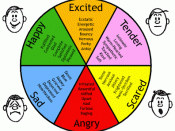Emotional Intelligence
Vivian Rodriguez
Grand Canyon University: UNV-504
March 26, 2014
Emotional Intelligence
Emotional intelligence is often referred to as the capacity to recognize, control and gauge emotions. In controversial suggestions some psychologists contend that emotional intelligence can acquired and therefore fortified, while other psychologists claim that an individual's personality and emotional intelligence is an inherited character trait. The emotional intelligence test that I administered returned some interesting information that I must analyze and begin to build upon in order to develop into a strong manager.
EQ Test
The EQ test revealed that I had above average emotional intelligence, with room for improvement. I was eluded to that fact that I am sensitive to the emotional climate of the people surrounding me, peers, friends, family and business associates. I am inapt to the effect that my actions have on other people. The area that I cannot ignore is my needs.
I concern myself with the needs of others, helping them with their workload, arranging work schedules that I forget my own. For example, at work people come to me with their distraught persona and desolate stories since they know that I cannot turn them away. I have a co-worker that will tug at my heart for the opportunity to ask for schedules trades, vacation trades, and job duties modifications. The areas for improvement in my emotional intelligence in this area is not to continually act upon my internal emotions for everyone else around me.
MEIT Test
The results of the MEIT test revealed a low score in self-awareness and a high score in self-management.
S Managing Emotions: The ability to manage emotions effectively is a key part of emotional intelligence. Regulating emotions, responding appropriately and responding to the emotions of others are all important aspect of emotional management.
elf-management
Allow yourself to hear your intuition. Do not over-think important decisions because you may
talk yourself into something that goes against your instincts and experience.
5. Seek out opportunities to thoughtfully and proactively make challenging decisions. Recognize
that even "negative" outcomes may be better than you expect, and gain confidence in your
ability to make great decisions.
Be a leader in your personal life and career by committing to make difficult decisions in a timely
manner. The best way you can inspire others to change is by making changes yourself. Practice this
process and become a confident leader of yourself and others. Just think of all of the time and energy
you will save in the process, and how great you will feel as you remain calm, trust yourself, and make
great decisions.
Self-Awareness
In the leadership context, "the effectiveness of self-awareness outcomes turns on developing or
accepting specific standards along with a strong desire for accurate self-evaluation,"( Ashley & Reiter-Palmon, 2012).
Reference
Ashley, G. C., & Reiter-Palmon, R. (2012). Self-Awareness and the evolution of leaders: The
need for a better measure of self-awareness. Journal of Behavioral & Applied Management, 14(1), 2-17.
Kase, L. (2010). Great Leaders are Great Decision-Makers. Graziadio Business Review, 13(4), 1.


